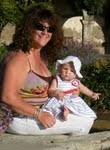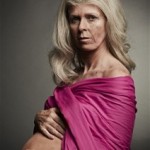 I guess it had to happen one day …
I guess it had to happen one day …
17 months have passed since she was born. I was 47 then, I’m (just) 49 now. Many people have congratulated me on my beautiful, funny, chatting, waving, singing, dancing daughter. And then, finally, along with the sunshine came the question that the media would like to think that I (as an ‘older mother’) get asked all the time. “Are you her Grandmother?” Oddly it wasn’t just once but twice in the same day … and both times by other (older-looking) women.
One was cheerfully sitting on a bench in the sunshine drinking whisky out of a paper cup at 11 in the morning, she offered me some, I said no thank you. She lent round and asked if I was Hope’s grandmother … I put it down to the alcohol and blurred vision. The other lady was an elegant older shop assistant in Boots, herself (it transpired) a grandmother. She saw me chatting with Hope and leaning over the pushchair, she bent down and looked at Hope and then up at me asking, “Are you a Grandma’s girl?”
I was tired that day after a night with poor Hope doing battle with the teething monster, but I was cheerful and the sun was out. I’d been for a meeting so was made up and in my smartest work clothes. Maybe the sunlight and the bright neon light in the shop highlighted my wrinkles. Or, maybe I just look ‘old’ and nobody has ever noticed before. Or, maybe it’s simply that people ask questions based on their own experience!!
Ultimately, it doesn’t matter to me (but I will go and get the grey hair that has appeared in my left eyebrow plucked out). I am who I am, and I am the age I am and I’m also proud to be the best mother I can. A few years ago, I was on a BA-flight to India and I was upgraded. One of the air hostesses came and sat down next to me and gave me a glass of fizz and said, “It’s so good to meet you finally. Jess talks so much about you all the time, she’s lucky to be such good friends with her Mum.” That did bother me, as I thought I looked a bit young to be the mother of a grown-up air hostess. But, as we all know, mothers come in all shapes and sizes, and many different ages. And, Grandmothers do, too.
The lady in Boots justified her thinking I was Hope’s granny by telling me she’d just served a 35-year-old grandmother. She was just being friendly and well meaning … as was the whisky-swigging lady in the sunshine. Neither commented in a judgemental way.
I wonder, though, if that will start to change with the rise of ‘ageist’ campaigns such as that by pregnancy testing kit manufacturer First Response. The ‘Get Britain Fertile’ http://www.getbritainfertile.com campaign is about to get into full swing with the aim of raising awareness of the decline in fertility that happens as women age, and getting people “fertility fit.” That, in itself, is not a bad thing, in my opinion. I don’t know much about the sex education children now receive in school and I’m sure it’s more ‘in-depth’ than mine was (Nuffield Science book 3; naked man and naked woman in the centre spread, *sniggers* when the book was closed and they were ontop of each other, and another page with picture of sperm entering egg). But, I don’t see how a campaign which vilifies the idea of older mothers will help.
The poster image that the campaign is using is one of breakfast TV presenter Kate Garraway, currently 46 with two children under 10, wrinkled and gnarled to look much older; looking very sad and holding onto a fulsome pregnancy bump. The message is clear: look how ugly you’ll look if wait and become a mother late in life. It doesn’t make any sense to me whatsoever. Kate Garraway had her children later than the average age of women, and now, at 46, she still looks fabulous. Surely the advertising agency has stuffed up here and should have used a much younger model if that really is the message they are aiming to deliver. So, on an advertising level it doesn’t make sense. On a cultural level, it is enforcing a negative message about older mothers. And (more importantly), it is saying nothing about the issues, very personal, of infertility.
As I said, I strongly believe that young women (and men) should be educated in the issues around fertility as a part of broader sex education. That being said, it is important to realise that for many people, infertility is a serious issue. Getting ‘fertility fit’ is one thing … cutting down on alcohol, giving up smoking, eating healthily, realising the impact of stress on fertility when trying to get pregnant are all vital messages that do need to be mainstreamed as does the reality of facing IVF or trying to conceive once fertility has started to decline.
Having children older is a whole different issue and the cliched, negative presumptions around older mothers need to be dispelled. I’ve never met anyone who had a child in their 40s because they were waiting for financial security. I’ve only once met someone who waited until her career was at dizzy heights before having a child. More often, women become mothers later because of wider life circumstance (often painful) … ultimately everybody lucky enough to become a parent has been on their own journey and should be respected as an individual.
The “Get Britain Fertile” campaign was announced on the same day as a YouGov poll came out stating that some 70% of British women think having a baby in your 40s is too late. Over 3/4 of those surveyed in the 55 and upwards age range shared that opinion. Perhaps it has to do with concerns for illness, physical ability, life expectancy (that isn’t clear from the study). But, again, what was stark and depressing was the launch of the campaign at the same time as the survey results alongside the unpleasant and unhelpful image of a beautiful mother in her mid-forties being aged and made pregnant.
First Response might do well to reflect on the messages they give out. They have successfully raised the profile of their campaign but in a very negative manner; one that doesn’t help young people made decisions as they plan their families (not that many people’s lives do go according to those youthful plans!!).
Shame on you Kate Garraway for allowing yourself to be depicted in such a negative and damaging manner when you, as an older mother yourself, were already in a position to influence in a positive and high profile way. As Julia says in Pretty Woman, “Big mistake. Huge!”
Society and the media seem to be trying to box us all up in neat packages to tie in with readership, with demographics; with customers rather than respecting mothers, whatever age and supporting, encouraging and celebrating motherhood.
Right then. This aged “old bag” is off to fill the paddling pool and sort out a teddy bear’s picnic, having planned a holiday, been for a walk, sorted out her daughter’s bank accounts, washed a mountain of small vests and dresses and done a day’s work.
Oh, and I must remember to do my eyebrows.

